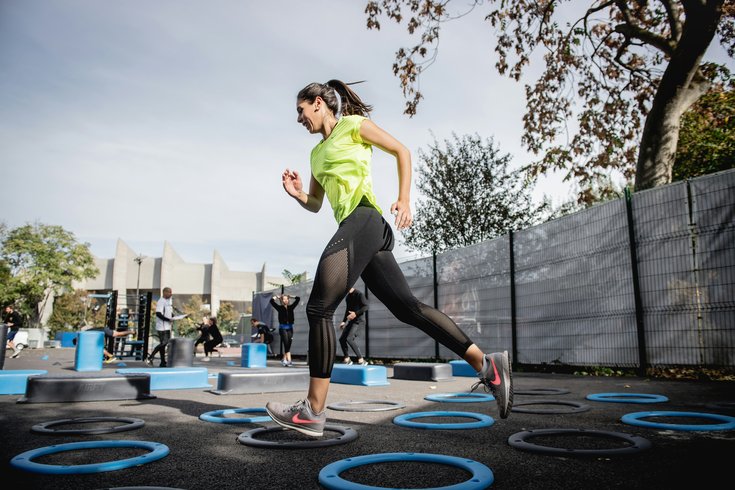
March 12, 2024
 Gabin Vallet/Unsplash
Gabin Vallet/Unsplash
Women may lower their mortality risk more than men with less-than or equivalent amounts of physical activity, according to a new study that examined links between sex and exercise benefits.
Exercise has been proven to benefit health in countless ways, and new research has discovered that women may need even less physical activity than men to live longer.
Women were found to reduce their risk of mortality more than men when both sexes engage in equivalent amounts of physical activity, according to a study published last month in the Journal of the American College of Cardiology.
The Centers for Disease Control and Prevention recommends that every adult get 150 minutes of moderate-intensity physical activity, and two days of muscle-strengthening activity, per week. Less than one-quarter of Americans meet the minimum guidelines for physical activity, according to the study.
While the recommendations are the same for men and women, the authors of the study say there is a "gender gap" in physical activity engagement. Women "persistently lag" behind men in physical activity engagement starting in early life and continuing through adulthood.
To address this "gender gap," researchers set out to evaluate whether benefits of physical activity differ by sex, in hopes of motivating women to engage in more regular physical activity in their leisure time. The study involved 412,413 U.S. adults — 55% of them were women — who provided survey data on leisure-time physical activity from 1997 through 2017. They found that about 33% of women and 43% of men regularly engaged in aerobic physical activity, and all major measures of physical activity were significantly more frequent in men.
Researchers examined participants' physical activity measures with death records, monitoring death by all causes with a specific focus on cardiovascular-related deaths, through 2019. During that follow-up period, there were nearly 40,000 deaths, including almost 12,000 cardiovascular deaths.
For women, regular physical activity compared with inactivity was associated with a 24% lower risk of death by all causes. For men, regular physical activity compared with inactivity was associated with a 15% lower risk of death by all causes.
Women also require less amounts of exercise to achieve more longevity benefits, according to the study.
The greatest mortality benefit in men was achieved at 300 minutes per week of moderate-to-vigorous exercise, with an 18% lower risk all-cause mortality. At just 140 minutes per week of moderate-to-vigorous exercise, women lowered their mortality risk by 18%. When women exercised 300 minutes a week, they lowered their risk of death by 24%. When it came to muscle strengthening activity, the study found that men got the most benefit from engaging in three sessions a week while women achieved the same benefit with just one muscle strengthening session a week.
These differences in physical activity benefits may stem from differences in physiology.
“Men require more exercise partially due to the fact that they have greater muscle mass and greater lean body mass,” Martha Gulati, a co-author of the study, told the Washington Post. “And so when they exercise, the benefit to the whole body, including the muscles, requires a greater duration.”
Gulati also said that men usually have proportionately larger hearts and muscle fibers than women, but women have a higher density of capillaries per unit of skeletal muscle. This means that, with smaller amounts of exercise, women can increase blood flow sooner than men.
The authors of the study hope the findings will encourage everyone to engage in regular physical activity, and that women — who generally lag behind in leisure-time physical activity levels — will note that a little exercise can go a long way.
"Overall, women compared with men derived greater gains in all-cause and cardiovascular mortality risk reduction from equivalent doses of leisure-time PA," the authors write. "These findings could motivate efforts to close the 'gender gap' by encouraging especially women to engage in any regular leisure-time PA. ... (S)ex-specific guidance could serve to motivate increased PA engagement particularly among women who stand to gain substantial health benefits."
Follow Franki & PhillyVoice on Twitter: @wordsbyfranki
| @thePhillyVoice
Like us on Facebook: PhillyVoice
Have a news tip? Let us know.